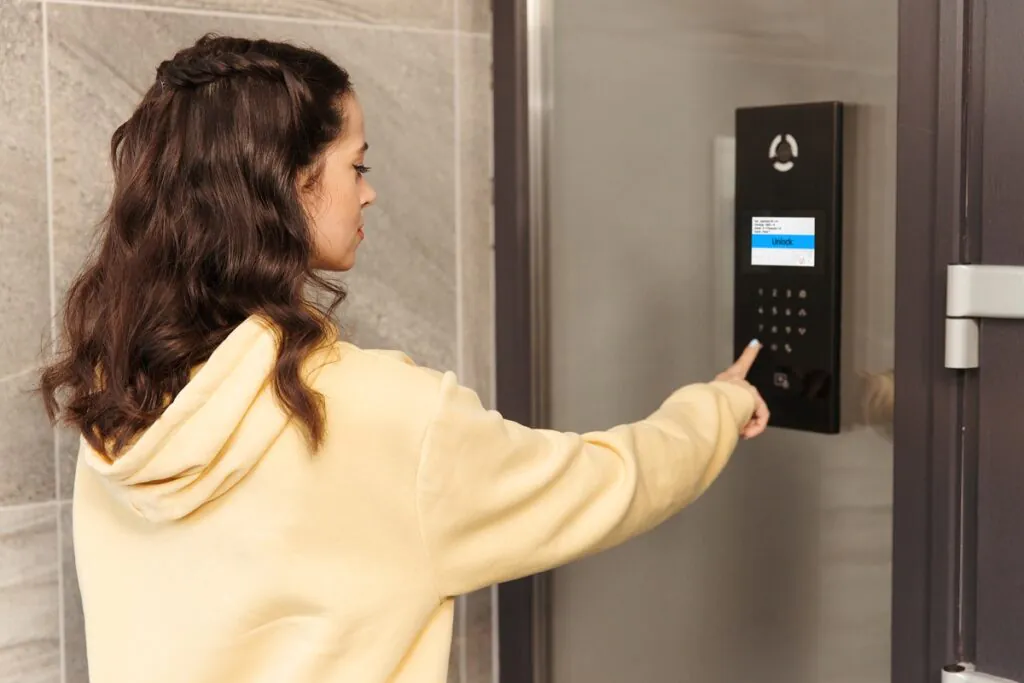Digital Intercom Systems: Modern Communication Solutions

Definition and Explanation
Digital Intercom Systems are communication devices used to facilitate a two-way communication system. They are typically used in buildings, offices, and homes to provide a secure and efficient way of communicating between different rooms or areas.
The term “Digital Intercom Systems” is used because these systems use digital technology for communication. Unlike traditional analog intercom systems, digital intercom systems convert audio signals into digital data, which can then be transmitted over various types of networks, including IP networks. This digital transmission allows for clearer sound quality, greater range, and the ability to integrate with other digital systems or devices.
Here’s a breakdown of the term:
- “Digital”: This refers to the use of digital technology, which involves the conversion of audio signals into digital data for transmission.
- “Intercom”: This is a contraction of “intercommunication”, which refers to the communication between two or more locations.
- “Systems”: This term is used to denote that it’s not just a single device, but a system of devices working together to facilitate communication.
Digital intercom systems have become increasingly popular as technology advances, providing improved communication and security for school, residential and commercial properties. This article will discuss the benefits of digital intercom systems, their key features, and maintenance tips to keep your system functioning optimally.
Types of Digital Intercoms
Digital intercom systems have emerged as a vital tool, enhancing connectivity within residential, commercial, and industrial settings. These systems have evolved significantly over the years, offering a range of features that cater to diverse needs. Let’s delve into the different types of digital intercom systems and their unique characteristics.
Residential
Residential digital intercom systems are designed to enhance the security and convenience of homes. They often come with features such as video capabilities, allowing homeowners to see who’s at the door before granting access. Some advanced models even offer remote access, enabling homeowners to communicate with visitors or monitor their property while they’re away.
Commercial
Commercial digital intercom systems are tailored to meet the needs of businesses, offices, and other commercial establishments. They often include advanced features like multiple channels for different departments, PA broadcasting capabilities, and integration with other security systems. These systems play a crucial role in ensuring seamless communication and enhancing security within commercial premises.
Industrial
Industrial intercom systems are built to withstand harsh environments often found in factories, warehouses, and other industrial settings. They are typically rugged, durable, and offer features like noise-cancellation to ensure clear communication despite the noisy surroundings. Some models also offer explosion-proof and weather-resistant features.
School
School intercom systems are specifically designed to cater to the communication needs of educational institutions. These systems often include features like PA broadcasting for school-wide announcements, integration with alarm systems for emergencies, and connectivity to classrooms for direct communication with teachers. They play a crucial role in ensuring efficient communication, safety, and security within the school premises.
| Type | Ideal For | Key Features | Benefits |
|---|---|---|---|
| Residential | Homes, Apartments | Video capabilities, Remote access | Enhanced security, Convenience |
| Commercial | Offices, Businesses | Multiple channels, PA broadcasting, Security system integration | Seamless communication, Improved security |
| Industrial | Factories, Warehouses | Noise-cancellation, Durability, Explosion-proof | Clear communication in noisy environments, Durability |
| School | Educational Institutions | PA broadcasting, Alarm system integration, Classroom connectivity | Efficient communication, Enhanced safety and security |
In conclusion, the type of intercom system you choose should align with your specific needs and the environment in which it will be used. Whether it’s for a quiet home, a bustling office, a noisy factory, or a busy school, there’s a digital intercom system out there that’s perfect for you.
Benefits

Enhanced Audio and Video Quality
Digital intercom systems offer superior audio and video quality compared to their analog counterparts. Digital signals are less susceptible to interference and degradation, ensuring clearer communication and better image resolution.
Increased Security
Digital intercom systems often incorporate advanced security features, such as encryption and secure communication protocols. This helps protect your system from unauthorized access and potential security breaches.
Scalability and Flexibility
Digital intercom systems can be easily expanded or reconfigured to accommodate changes in property size or layout. This makes them an ideal choice for growing businesses or properties with evolving communication needs.
Breakdown by Cable Type
Digital intercom systems can be also categorized based on the type of cable used for their installation. The type of cable used can have a significant impact on the system’s performance, installation process, and cost. Here are some examples:
1. Two-Wire Digital Intercom Systems
Two-wire digital intercom systems use a pair of wires to transmit audio, video, and power signals. This type of system is relatively easy to install, especially in retrofit situations where existing wiring can be used. Brands that use two-wire technology include:
2. IP Digital Intercom Systems
IP digital intercom systems use Ethernet cables, such as CAT5 or CAT6, to transmit data. These systems are often more advanced, offering high-quality audio and video, and the ability to connect to the internet for remote access and control. They may require a more complex installation process, but they offer greater flexibility and scalability. Brands that use IP technology include:
Key Features
- Video Capabilities: Many digital intercom systems include video functionality, allowing users to see visitors before granting access to the property.
- Smartphone Integration: Digital intercoms can often be integrated with smartphones or other mobile devices, providing remote access and control capabilities.
- Multiple Zone Support: Digital systems can support communication between multiple zones or areas within a property, facilitating more efficient communication and access control.
- Intercom-to-Intercom Calls: Some digital intercom systems allow users to make intercom-to-intercom calls, enabling communication between different rooms or areas without requiring a telephone connection.
Maintenance Tips
To keep your digital intercom system functioning optimally, follow these maintenance tips:
- Regular Cleaning: Clean the indoor and entrance intercoms using a soft cloth and mild cleaning solution to prevent dirt and debris buildup that could affect performance.
- Visual Inspections: Perform regular visual inspections of the system components, checking for signs of wear or damage.
- Software Updates: Keep the intercom system’s software up-to-date by following the manufacturer’s recommendations for updates.
- Network Maintenance: Ensure the network infrastructure supporting your digital intercom system is properly maintained, including routers, switches, and network cables.
Conclusion
Digital intercom systems offer numerous benefits, such as enhanced audio and video quality, increased security, and scalability. By incorporating advanced features like video capabilities and smartphone integration, these systems provide modern communication solutions for residential and commercial properties. Regular maintenance, including cleaning, visual inspections, and software updates, will ensure your digital intercom system remains reliable and effective.